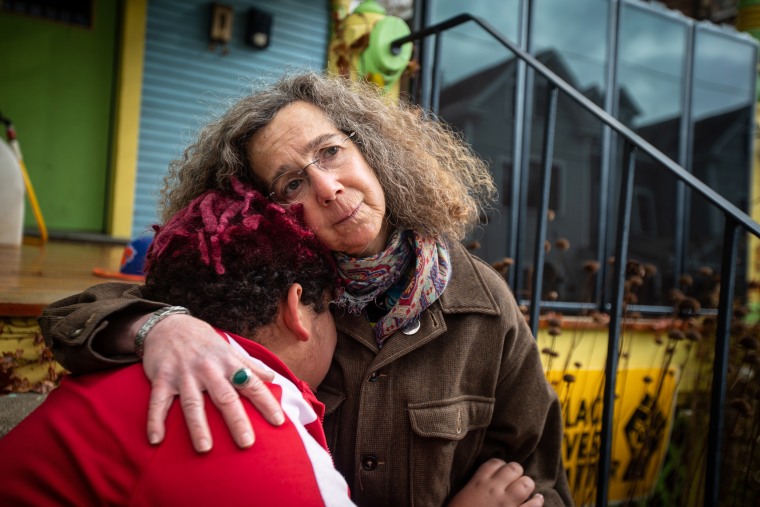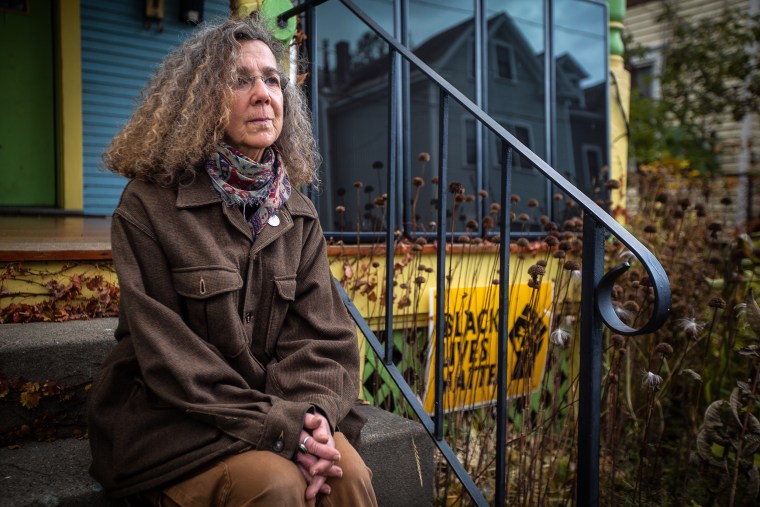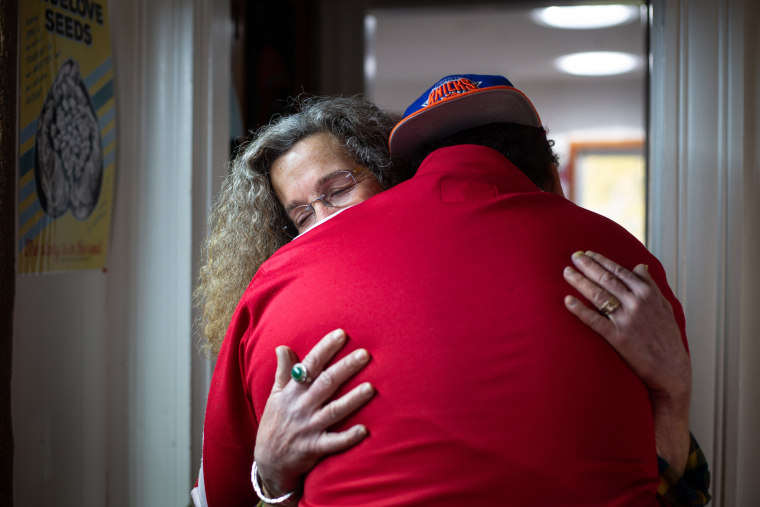In May, Cathy Austrian called the police after her then-14-year-old came home with dozens of vapes stolen from a convenience store in Burlington, Vermont. Austrian wanted her child, who has struggled for years with behavioral and mental health issues, to learn right from wrong. But after police came, the situation took a violent turn.
Austrian’s child was sitting on the edge of a bed and wouldn’t respond as the two officers tried for nearly 10 minutes to coax the teen into turning over the vapes, according to body camera footage Austrian provided to NBC News.
The officers remained by the doorway as Austrian searched the room and recovered all of the vapes except for the one in her child’s hand. (NBC News is not identifying the teen, who is nonbinary and uses the pronouns they/them, because they are a minor.)
Austrian spent about 15 seconds trying to get the teen to hand over the vape. Then the officers moved in, repeating that they would have to arrest and handcuff the teen if it wasn’t turned over, the body camera footage showed.
“You don’t want to do this,” one of the officers said, the footage showed.
The officers pinned Austrian’s child to the bed and pried the vape out of the teen’s hand. The teen lunged at them, hands and arms swinging, prompting the officers to force the teen to the ground and into a prone position, the body camera footage showed.
Paramedics arrived about 15 minutes later and put a mesh sleeve, often called a “spit sock,” over the screaming teen’s head. Then they injected the teen with ketamine, a sedative drug, and carried the limp body out of the house as Austrian looked on.
“It was just a nightmare,” Austrian, 64, told NBC News. “It’s something that you never would expect to ever have happened.”
It’s a problem that has plagued law enforcement for decades: how police respond to people in a mental health crisis. Yet many police departments have been slow to reform their tactics.
Mental health and criminal justice experts say the majority of police departments, even the most progressive, are still far from implementing best practices — especially when it comes to the thorniest cases, such as those involving children or interactions in which a crime is alleged to have been committed.
“Despite our efforts to really improve crisis response and create an alternative crisis response, I think we’re still a bit of a ways from that,” said Shannon Scully, senior manager of criminal justice policy at the National Alliance on Mental Illness, or NAMI.
In Burlington, for example, a key reform that was implemented months after the incident involving Austrian’s child — the dispatching of social workers to certain calls — wouldn’t have been used in the case. Under departmental policy, social workers don’t respond to calls that involve the report of a potential crime.
Experts say the push to reduce police encounters with people who have mental illnesses is an important step, but without increased police training, more adverse encounters are inevitable.
“If we’re going to avoid these disastrous outcomes, when they recognize — and they should be trained to recognize — that they’re dealing with somebody who has a serious mental illness, they should pull back,” Paul S. Appelbaum, a professor of psychiatry, medicine and law at Columbia University, said, speaking generally about police encounters with people with mental health issues.
“It will give us much better outcomes than the current take-charge approach of the police in these situations, which so often leads to tragedy.”
The main form of training, known as Crisis Intervention Team training, has been in existence for decades. It began in Memphis, Tennessee, after police fatally shot a Black man who had a history of mental illness. The department partnered with NAMI to create a training program for officers.
Known as the Memphis Model, it’s a 40-hour course that goes beyond training for individual officers. It also provides a road map for how communities can create a comprehensive response to mental health calls by working with social service agencies.
Ron Bruno, the executive director of CIT International, which provides guidance on how to implement the program, said many departments treat it as only training and forgo implementing the more comprehensive approach.
“I think that chiefs look at it like a liability issue, let’s check the box off,” Bruno said. “I’ve literally had chiefs tell me that they’re not going to let anybody tell them how to train their cops. They’ll do what they want.”
People in a mental health crisis are 16 times more likely to have fatal interactions with police, according to a study by the nonprofit Treatment Advocacy Center. Experts say not only are officers often unprepared, but their presence alone can make a situation worse.
“Every time an officer’s present, it can escalate a situation that might not have escalated,” Bruno said.
Burlington police, which is regarded as one of the most progressive departments in the nation, has had three deadly interactions with individuals who have mental health issues.
In 2013, an officer fatally shot Wayne Brunette outside his parents’ home after his mother called 911 because he was behaving erratically. In response to a lawsuit by the family, the city said that the use of force was objectively reasonable, but later settled the suit for $270,000.
In 2016, an officer fatally shot 76-year-old Phil Grenon, who was facing eviction and in the throes of an escalating mental health crisis, after advancing toward officers while holding two knives.
And in 2019, Douglas Kilburn became irate when he was denied access to see his wife, who was a patient at University of Vermont Medical Center. An officer told Kilburn to leave, and cursed at him, body camera footage showed, prompting Kilburn to punch him. The officer struck back, punching Kilburn three times.
The man, who was in poor mental health, was found dead a few days later, officials said. The medical examiner ruled his death a homicide.
The state attorney general declined to file charges against the officer and said the force was justified but the officer’s actions before the fight led to the altercation. The officer did not face discipline from the department, but did receive a letter of reprimand for swearing. The city ultimately settled a wrongful death lawsuit with the family for $45,000.
Burlington police has been criticized for not ramping up its training for interactions with people who have mental illnesses.
A recent analysis done by an outside consultant — and reviewed by NBC News — found Burlington Police Department’s participation in the free state training for mental health was minimal. In the nine years of the program’s existence, the department has only sent 23 officers, less than a quarter of the force, to the training.
The two officers involved in the incident in Austrian’s home have never had the training, according to records reviewed by NBC News.
“I would certainly love them to be more active, given the culture up there and what’s going on,” training coordinator Kristin Chandler said. “I think it could be more helpful.”
‘Like an animal’
Austrian said she didn’t hesitate to call the police on her adoptive child — who has been diagnosed with early childhood developmental trauma, ADHD and an intellectual disability — that day in May.
“It’s up to me, as the adult, to do the right thing, whatever that right thing is,” Austrian, who is a single mother, said.
Burlington police officers were already at the convenience store where the alleged theft took place — workers had called 911 after Austrian’s child left.
Cashiers told the officers the teen threatened them with a mallet and a knife (it was kitchen shears, according to Austrian). One cashier described the teen, who is 5-foot-8 and weighs about 230 pounds, as “awkward” and “scary,” according to body camera footage obtained by NBC News.
The same two officers showed up at Austrian’s house.
This wasn’t the family’s first interaction with Burlington police. Austrian had called 911 several times before, when her child was at risk of hurting themselves or others. The incidents were all resolved peacefully, she said. When the officers arrived around 7:30 p.m., Austrian told them her child had a rough week, body camera footage showed.
Austrian said the teen’s ADHD medication had recently been increased, they’d received an MRI for a heart condition, and they had been acting both erratic and distant. She also told police the teen didn’t have any weapons. She handed them the bag of vapes and explained that there were more upstairs, the footage showed.
Roughly 10 minutes later, her biracial child was on the floor, screaming, as the officers held down the teen’s arms and legs.
It was “just like an animal being pinned down,” Austrian said.

She believes race played a factor in the encounter.
“I don’t think they were responding to my child as a child. I think they were responding to my child as a Black man,” Austrian added.
According to the Burlington Fire Department, the paramedics consulted with a physician before administering ketamine. The teen was taken to a hospital and released the following morning.
The teen was charged with retail theft, assault of a protected professional and assault with bodily fluids. The total value of the stolen vapes was $808, a police incident report said.
According to acting Police Chief Jon Murad, the police referred the case to the Burlington Community Justice Center, which provides an alternative path to resolving charges without going through the court system.
After reviewing the incident, Murad concluded that it constituted an appropriate use of force. He declined to comment further on the incident.
Jay Diaz, an attorney with the American Civil Liberties Union of Vermont, who reviewed the incident, feels differently.
“There is no need to engage someone physically, where they don’t present any kind of danger to the officer, themselves or others,” he said. “Full stop.”
Brian Higgins, a retired police chief in Bergen County, New Jersey, who serves as an expert witness in use-of-force lawsuits, reviewed the footage from the incident and described it as “horrific.”
He said he didn’t see a reason for the officers to restrain the teen to recover the last vape.
“At some point, they could have thought, ‘What’s the purpose? What are we going to do with this young man?’” said Higgins, who also works as an adjunct professor at the John Jay College of Criminal Justice in New York.
He said the incident likely reflects a broader issue with how the department handles mental health calls.
“I put this more on the agency,” he said. “Those cops were not trained, and there weren’t proper policies and procedures. I think the cops did the best they could within the circumstances presented.”
In a statement to NBC News, Murad said the department is sending 10 employees to Vermont’s crisis intervention training in May. He declined to identify the employees, but records reviewed by NBC News showed that the two officers involved in the Austrian incident are among them.
Murad also said the department relies more heavily on a different training program, known as ICAT, for its crisis response. ICAT trains officers in how to respond to situations in which subjects are behaving erratically but do not possess a firearm.
“ICAT is the core of our patrol officer training regarding decision-making, crisis communications, and tactics,” Murad said.
‘A dangerous precursor’
The decentralization of law enforcement in the United States makes it difficult to quantify the number of officers who’ve been trained to interact with people who have mental illnesses. But some departments are known to be taking a proactive approach.
The city of Eugene, Oregon, uses its own crisis response program called CAHOOTS. Since 1989, the city has incorporated a separate team of crisis workers and medics to respond to calls involving behavioral health crises. If the call involves a crime in progress, then police will dispatch as primary or co-responders. Officers can also request a CAHOOTS worker, if they arrive on scene and determine it could be helpful.
The crisis workers handle about 17 percent of the emergency call volume, according to CAHOOTS.
Olympia, Washington, modeled its so-called Crisis Response Unit on CAHOOTS.
Dispatchers share all potentially relevant calls with the unit, which then determines if the call requires a crisis worker to respond. Police can also refer calls to the unit, and members of the public can request that a crisis worker, rather than a police officer, respond to an incident, as well.
Other cities, such as Los Angeles and Portland, Oregon, began creating integrated approaches after the murder of George Floyd. Burlington is in the early stages of implementing a new system modeled after CAHOOTS.
The City Council approved a controversial resolution in June 2020 to reduce the size of the force by 30 percent by attrition. It also included adding social workers to respond to mental health and substance abuse calls. Three social workers were sworn in last October and have begun responding to calls.
Lacey Smith, who oversees the social workers, said Burlington has often relied on police to solve social issues and has criminalized behaviors that don’t require a law enforcement response. She and her team are there to fill that gap.
“Oftentimes in mental health calls, the hardest part of it for officers is that that stuff takes time,” Smith said.
“In order to make people feel supported, you need to spend time with them,” she added.
In the fall, the Burlington City Council approved allocating $400,000 for acute mental health services.
Another key reform matter remains undecided: how oversight of the police is conducted.

Shortly after the incident involving her child, Austrian filed a citizen complaint requesting body camera footage and a review of the officers’ conduct.
“The outcome of this incident has placed an even larger divide in my [child’s] lack of trust in law enforcement,” she wrote in her complaint. “This is exactly the wrong relationship and is a dangerous precursor for [their] future.”
After Murad reviewed Austrian’s complaint, it was sent to the police commission, an elected body of civilians who review civilian complaints and suggest policy changes.
In September, the commission submitted its final determination to Murad. He told NBC News that he accepted three of its four recommendations. The recommendations are not available to the public — or even to a complainant like Austrian — and Murad declined to provide details.
More than eight months after the incident, Austrian says she is still grasping for answers.
“It is just overwhelming to feel like, where is justice,” she said.
